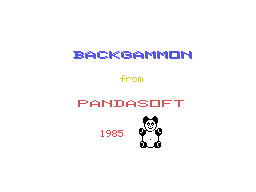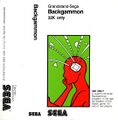Difference between revisions of "Backgammon"
From Sega Retro
m (Text replacement - "Grandstand" to "Grandstand Leisure") |
|||
| Line 1: | Line 1: | ||
{{Bob | {{Bob | ||
| bobscreen=Backgammon SC3000 AU Titlescreen.png | | bobscreen=Backgammon SC3000 AU Titlescreen.png | ||
| − | | publisher={{company|[[John Sands Electronics]]|region=AU}}, {{company|[[Grandstand]]|region=NZ}} | + | | publisher={{company|[[John Sands Electronics]]|region=AU}}, {{company|[[Grandstand Leisure]]|region=NZ}} |
| developer=[[Pandasoft]] | | developer=[[Pandasoft]] | ||
| system=[[SC-3000]] | | system=[[SC-3000]] | ||
Latest revision as of 14:34, 6 November 2024
| Backgammon | |||||||||||||||
|---|---|---|---|---|---|---|---|---|---|---|---|---|---|---|---|
| System(s): SC-3000 | |||||||||||||||
| Publisher: John Sands Electronics (AU), Grandstand Leisure (NZ) | |||||||||||||||
| Developer: Pandasoft | |||||||||||||||
| Genre: Table | |||||||||||||||
| Number of players: 1-2 | |||||||||||||||
|
This teeny-tiny article needs some work. You can help us by expanding it.
Backgammon is a is an SC-3000 interpretation of backgammon, developed by Australian company Pandasoft and released in 1985. It was published in Australia by John Sands Electronics as part of its Screen Boardgame Software Cassette series.
This game required 48 KB of RAM, which means it can only be played with the BASIC Level III B cartridge.
Synopsis
| “ |
A great game which can be played by two people, or by one person against the computer. The object being to move all your pieces around the board - and then out. The winner being the player whose pieces are moved off the board first. |
„ |
— Box frontcover [3] | ||
| “ |
Backgammon is said to have been enjoyed for several hundred years, its origins now possibly lost in time. One of the major attractions of Backgammon is that it takes a very short time to learn - but the enjoyment of playing lasts forever. The John Sands Sega version of the game is presented in a most interesting and involving way and moves are easily made. By playing against the computer, you are certain to improve your game when the time comes to try your skill at beating a real live opponent. Each player begins with 15 pieces set out in the correct starting pattern on the board. The intention of the game is to move the pieces around and, finally, off the board - the length of moves being decided by throwing two dice. The first player to move all pieces off the board is the winner. Although Backgammon may appear to be a game of chance, good players (who calculate the odds of certain numbers appearing on the throw of the dice) can usually beat a less experienced player. The more you play, the more this will become apparent. Once you start, you may never stop! |
„ |
— Box backcover [3] | ||
Magazine articles
- Main article: Backgammon/Magazine articles.









